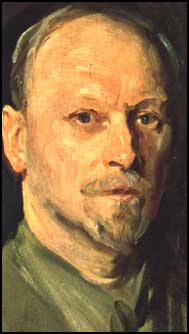Jan Smuts

Jan Christian Smuts was born in Malmesbury, Cape Colony in 1870. Educated at Christ's College, Cambridge he returned to South Africa where he became the state attorney of Johannesburg and a member of Paul Kruger's government. In 1899 Smuts contributed to A Century of Wrong, a pamphlet that explained the Boer case against Britain.
During the Boer War (1899-1902) Smuts established himself as a guerrilla leader of exceptional talent. Smuts was also one of the leading negotiators involved in the production of the Vereeniging Peace Treaty (1902). An opponent of extreme nationalism, Smuts argued that South Africa's future lay in co-operation with Britain.
Smuts held a succession of cabinet posts, including defence minister, under President Louis Botha but on the outbreak of the First World War, Smuts rejoined the army and led South Africa's successful campaign in German East-Africa.
In 1917 David Lloyd George invited Smuts to join the Imperial War Cabinet in London. He soon obtained a high reputation and was an influential figure in devising Allied war strategy. While in England he played a leading role in establishing the Royal Air Force.
At the Paris Peace Conference, Smuts worked closely with Woodrow Wilson, in advocating a League of Nations. Smuts returned to South Africa after the signing of the Versailles Treaty in 1919 and soon afterwards became prime minister. Smuts lost power in 1924 but later returned to office as deputy prime minister (1933-39) and prime minister (1939-48).
Smuts worked closely with Winston Churchill during the Second World War and was the only man to sign the peace treaties at the end of both wars. Smuts was also a leading figure in the drafting of the United Nations Covenant. Jan Christian Smuts died in 1950.
Primary Sources
(1) Arthur Harris, Bomber Command (1947)
There are many outstanding things about Smuts, the brilliance of his intellect, his immense physical hardiness and toughness so that you cannot believe you are looking, not at a man of forty, but of seventy, his great personal bravery, and his delightful sense of humour. Speaking in a clear, high-pitched voice, he will give you the answer to almost any proposition that you put before him. A practical answer, and a better one than most. Smuts of course puts the welfare of his country first. But he undoubtedly believes that the best thing for the world is the extension of the ideas that have produced the British Commonwealth. The most brilliant, if not the most bitter opponent of ours during the Boer War, he has never forgotten the aftermath, when the Transvaal and the Orange Free State were handed back, and indeed the whole of "South" Africa including such predominantly " British" places as Natal and the Cape, and the Union of South Africa at last brought into being. He regards that as a most extraordinary example of far-sighted statesmanship, as indeed it was; not only because it brought into the Commonwealth such great Boer patriots as Smuts and Botha, but it healed also to a large extent the spiritual wounds of Boer and British in South Africa.
Though Smuts had predicted how the air war would develop as long ago as 1917, I could see that he was astounded by what I showed him at Bomber Command; it was then that he realised in full for the first time what our bomber offensive meant to the war as a whole. I knew I was assured of his support in military
affairs if I should require it. He told me that he. would talk to Winston about what we had done, but I do not know whether he in fact got the opportunity to do so. I did not worry much about that, because I knew that Winston himself always wanted to know first hand about everything.
(2) Anthony Eden, diary entry (24th October, 1940)
Smuts and I had some private talk last evening and this morning. He was in splendid health, most cheerful and friendly. We spoke of men and events at home. Smuts was warm in his appreciation of Winston, a great fellow. How ill was Chamberlain, was his resignation really health or diplomatic. When I told him how ill Neville was, Smuts murmured: 'Poor fellow', and then in speaking of Neville's foreign policy continued: 'He must have been very badly advised. It is extraordinary that anyone could have been so deeply deceived.' He was particularly critical of Neville's confidence in Hitler's signature and their joint manifesto after Munich.
As to his own position, Smuts was confident. His trouble was the existence in South Africa of what he called a 'middle-west opinion'; real isolationists who did not think that the war was any concern of theirs. These were far more of a problem than pro-German element represented by Mr. Oswald Pirow (former Defence Minister). General Sir Pierre Van Ryneveld, Smuts' Chief of Staff, with whom I also had some talk and whom I liked very much, was vehement in his denunciation of Pirow, under whom he had to work for many years. He maintained that if Smuts had not won in Parliament when war broke out, there would have been fighting in the country. Smuts could not have been more helpful or reasonable in his demands for equipment. The conversations as a whole were as satisfactory as could be.
(3) Winston Churchill, letter to Christian Smuts (8th May, 1941)
I wonder if you would care for me to suggest to the King your appointment as an Honorary Field-Marshal of the British Army. It seems to me that the great part you are playing in our military affairs and the importance of the South African Army would make this appropriate in every way, and I need not say how pleasing it would be to your old friend and comrade to pay you this compliment.
